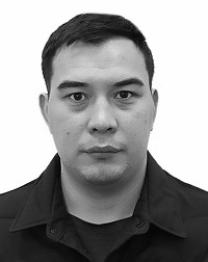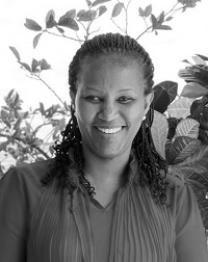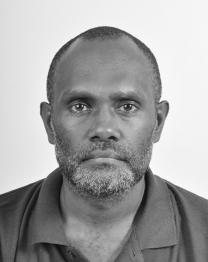Or watch the entire session:
Trade facilitation ecosystem is very much linked to the progress made by technology towards the digitalization of the trade environment. The simplification and streamlining of the trade procedures are being undertaken through the customs automation and the online access to a single point of information (with the Trade Information Portals) but also a single point of transactions for customs clearance (with the Single Windows). Efficiency of trade facilitation means reducing time consuming formalities and paper-based procedures and this can only happen with the integration of IT tools and technology in the border services.
What are the conditions for the Governments and the Regional Economic Communities (RECs) to ensure that at national and regional levels, the trade facilitation ecosystem integrates the required technology to transform the public services in order to best serve the business community?

Jane Musyoki is the Officer in charge of Trade Information Portal and Value Add Services at Kenya Trade Network Agency (KenTrade); the organization mandated to facilitate cross border trade and establish, manage and implement the National Electronic Single Window System in Kenya. She has progressive experience in International Trade for Eight years.
Jane holds a Masters degree in Business Administration (Strategic Management) from the University of Nairobi and is a communication graduate from the same University. She has a post graduate diploma in Information and Technology, Certificate in Trade Law & Policy and is also a Master trainer in Trade facilitation Agreement in East Africa Community Bloc. She is a PRINCE2 Practictioner in certification in managing successful projects as well as a TRALAC Alumni.
Stanley Trief is currently the Manager of the Vanuatu electronic Single Window (VeSW) Project. The VeSW Project is funded by the Enhance Integrated Framework (EIF) and the Australian Government with support from the Vanuatu Government. Using ASYCUDA World as the system’s platform, the VeSW Project commenced in 2019.
Prior to managing the VeSW Project, Stanley was the Manager of Vanuatu’s ASYCUDA World Project from 2016 – 2018. The Project was to upgrade the Customs system in Vanuatu from ASYCUDA++, which Vanuatu was using since 1999, to the latest version of ASYCUDA.
Stanley is a customs manager by profession, managing the Customs Border Control and Enforcement unit of Vanuatu Customs from 2011 to 2015. He is also a qualified Computer Science graduate and was managing the Information, Communication and Telecommunication unit of Vanuatu since 2004 prior to moving to Customs operations.
In the Pacific region, Stanley has conducted multiple Customs modernization assessments in Pacific Island countries since 2006 to 2019, before the borders closed due to the pandemic.
Stanley holds a Bachelor of Science from the New Zealand University of Waikato and a Master of International Customs Law and Administration from the Australian University of Canberra. He is passionate about implementing reform and modernization initiatives in both Customs and in the areas trade of facilitation.

Zhomart Yeleussizov the chief expert of Division of non-tariff regulation of Department of foreign trade of Ministry of trade and integration of the Republic of Kazakhstan. One of the duties of Zhomart Yeleusizov is to coordinate the implementation of the WTO Trade Facilitation Agreement, as well as participates in the development of the Methodology for the Study of the time of release of goods. In October 2020, at the meeting of the WTO Committee on Trade Facilitation, he presented the results of the Republic of Kazakhstan on implementation of the provisions of the WTO FTA. In November 2020, he took part in the 16th session of the SPECA Trade Working Group in Tashkent, Uzbekistan.
He received the Bachelor of Business Administration in International Business Program at American Intercontinental University, London, UK in 2013 and received Master degree of International Business Program at HULT International Business School, London, UK in 2014. In particular, Zhomart Yeleussizov participated in the WTO Regional Trade Policy Course for countries of Central and Eastern Europe, Central Asia, and the Caucasus organized by the WTO Institute for Training and Technical Cooperation and received the Diploma, as well he took participation in WTO Advanced Trade Policy Course in Geneva, Switzerland and received the Diploma. He believes that the tools used in trade facilitation will make a significant contribution to the development of trade, as well as positively affect the country's image in the international arena
David Tello Cepeda, 39 years old, agronomist graduated from the Central University of Ecuador; he was a phytosanitary inspector of ornamentals for export for AGROCALIDAD; coordinator of the group of phytosanitary inspectors in the post-harvest room for 4 years (2009 -2012).He is currently responsible for Ecuador's Export Ornamentals Certification Programme; supervisor of Phytosanitary Certification processes for exports of agricultural products at national level, preparation of regulations concerning Phytosanitary Certification, analysis of information resulting from phytosanitary inspections and issuance of Phytosanitary Export Certificates at national level since 2012.
Since 2016, he has been responsible for the implementation of the electronic phytosanitary certificate” (Ephyto) issuance system in Ecuador.

Ms. Flavia Busingye is the current Acting Director of Customs at the EAC Secretariat. She has championed a number of trade facilitation initiatives including development and implementation of the Single Customs Territory and other various regional projects and programs on Customs and trade in the region.
Prior, she was the Head of Trade Management in the Rwanda Revenue Authority where she was instrumental in a number of strategic and operational initiatives. She was a team leader of the negotiations of Rwanda’s joining the East African Community. She holds a Master Degree in International and Economic Business Law from the University of Groningen, The Netherlands. She has undertaken trainings in customs, trade, and other programmes on Strategic Management.
Eugene Torero is the Regional Director, Horn of Africa at TMEA. In his previous role as the Director for Trade Policy/Facilitation, he led the UNCTAD/TMEA trade facilitation project that supported East Africa Community Partner States to implement the WTO TFA compliance efforts. Eugene was also responsible for the establishment of the TMEA South Sudan Country programme whose main goal was to design and implement a customs development and trade facilitation programme in South Sudan. Prior to joining TMEA, Eugene held various positions at Rwanda Revenue Authority including that of leading customs services from 2005 - 2010.





